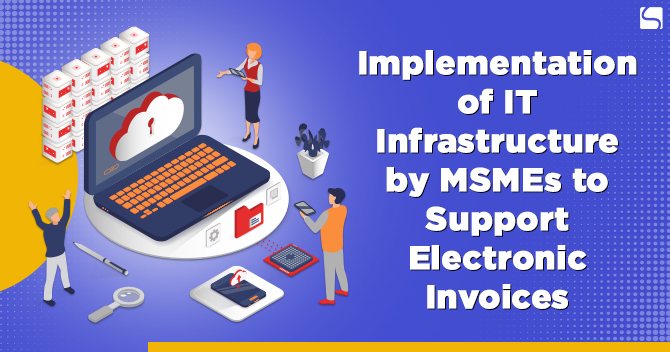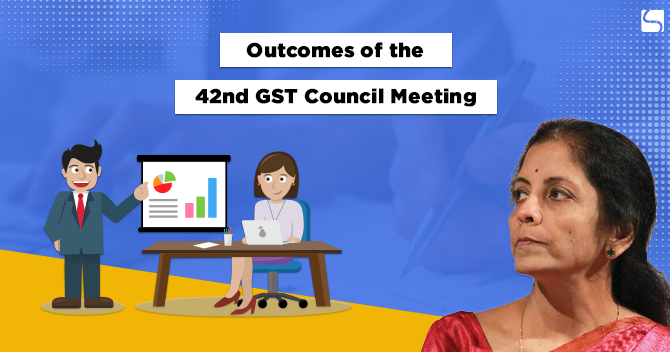Implementation of IT Infrastructure by MSMEs to Support Electronic Invoices

Shivani Jain | Updated: Nov 21, 2020 | Category: MSME, News
‘Electronic Invoices’ or ‘E-invoicing’ is basically a type of electronic billing, which plays a significant role in the GST framework.
Recently, the Central Government by way of a Notification No. 88/ 2020 [1], dated 10.11.2020, has declared that the facility of electronic invoicing or e-invoicing is going to be compulsory for every business that has an annual business turnover of Rs 100 crores or more. However, as per the previous regulations, the said limit was 500 crores.
In this blog, we will discuss in detail the implementation of IT Infrastructure by MSME to Support Electronic Invoices.
Table of Contents
Concept of Electronic Invoicing
The term GST e-invoice or electronic invoicing means the digital invoice or the standard format of invoices, which is generated on the GST portal for the goods and services provided by the business firms. Further, the main reason behind the implementation of GST e-invoice generation mechanism is to reduce the cases of GST evasion.
Also, the mechanism of e-invoicing will be applicable to only those who have crossed the threshold of annual business turnover set by the government.
Applicability of Electronic Invoicing in MSME Sector
Earlier, the business that used to generate the annual business turnover of Rs 500 crores or more were required to generate business invoices by the method of e-invoicing.
However, after the issuance of the notification, the said limit has now been reduced to Rs 100 crores. That means the small businesses that were not required to bother about e-invoicing are now upgrading their IT (Infrastructure Technology) mechanisms to adhere to the rules and regulations prescribed by the government.
Also, it shall be pertinent to state that there are some privileged sectors who need to generate electronic invoices. The term “Privileged Sectors” include SEZ units, NBFCs, Insurance Companies, Goods Transport Dealers, Cinema Houses, Passengers Transport Services, etc.
Benefits of Electronic Invoicing
The benefits of Electronic Invoices are as follows:
- Simplified GST Compliance
- Precision in Work
- Lesser Reconciliation Errors
- Price Reduction
- Minimized Paperwork and Documentation
- Provides Effective Functioning of Capital Performance.
- Improves Business Efficiency
Need for Implementing IT Structure in MSME Sector
As per the views expressed by various tax experts, the decision of the Central Government to reduce the threshold limit for e-invoice compliance from Rs 500 Crores to Rs 100 Crores is in harmony with the original plan introduced by the GST Implementation Committee.
Anticipated Challenges for Small Businesses
The major challenge that has been anticipated by the industry trackers for the small businesses is that they require huge investment for IT Infrastructure that, too in the limited time frame, i.e., within a period of 50 days, starting from the date of notification.
Different Views on Electronic Invoicing in MSME Sector
According to Mr Abhishek Jain, Tax Partner, Ernst and Young India, as per the recent declarations made by various Government officials, e-invoicing or electronic invoice has now been notified for Rs 100 crore and above for MSME companies as well. Further, due to the period of approx. 50 days, these mid-size companies will need to soon gear up their IT systems/ mechanisms or processes to facilitate compliance with this new invoicing regulation.
As per Mahesh Jai Singh, Partner and Leader of Indirect Tax, Deloitte India, ‘This approach of implementing the requirement in a phased manner has been a decent move, permitting the system to stabilize and offering the MSME’s an additional time period of 3 months to introduce the changes to their IT systems.’
Further Mr Mahesh Jain Singh, stated that the larger companies and entities that have successfully implemented and adhered with the new requirement will now have to shift their focus on the procurement process. Also, the robust mechanisms and checks are required to be kept in place to make sure that all the vendors who need to comply based on the revised limit from 01.01.2020 provide them with valid e-invoices.
Expected Outcomes of Electronic Invoicing in MSME Sector
The expected outcomes of Electronic invoicing in MSME Sector are as follows:
- Facilitates tracking of the issuance of fake invoices.
- Abolishes fraudulent credits taken by business entities more strictly.
- Provides blocking of Tax Credit Score of suspected firms.
- Allows set off of ITC (Input Tax Credit) with future tax obligations.
Conclusion
In a nutshell, although the MSMEs or small businesses generate high revenue and income for the Government collectively but are highly vulnerable and fragile on an individual level. As a result, exposing these businesses with heavy changes might turn out severe for them.
Therefore, for bringing any change in the system, these entities not only require to upgrade their knowledge and skills level but need to reframe their system as well.
However, it shall be relevant to note that it is not easy for MSMEs and small businesses to adapt to new changes with limited or restricted resources, even though there are some benefits for MSMEs in the New System as well.
Also, the new mechanism for filing GST Return does not hamper the privileges offered to the MSMEs, and in fact, the actual implementation of the system will paint out a clearer picture of the real effects of the new system.
Also, Read: What is the Procedure Required for MSME Registration in India?














